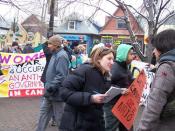Part 1: The Theory
Poor communication is responsible for the effectiveness of community policing. The article used for part 1 is titled Overcoming barriers to communication between police and socially disadvantage neighborhoods: a critical theory of community policing, by author Stephen Schneider. Research on his theory is conducted in socially disadvantaged neighborhoods, where community policing is needed the most. Primary research was established in the East Vancouver neighborhood, Mount Pleasant, because of "its disadvantaged nature and the presence of both community policing programs and practices" (Schneider, 1999:349). Immigrants and minorities were the main residence. The research was qualitative and was centered on participant observation. Schneider held a voluntary position for the Mount Pleasant Crime Prevention Office and worked closely with the Vancouver Police Department. These two working environments helped him observe the communicative obstacles between police and residents. He states: "community crime prevention is premised on the belief that for neighborhoods to promote community safety, action must be pursued through a collective effort" (Schneider, 1999:352).
This is only able to occur if there is a good relationship between the police and the community, which must happen through good communication. The theory suggests that this is difficult to achieve in a socially disadvantaged neighborhood.
Firstly, without proper communication between the police and the community, frustration occurs. This hinders individuals in the community who are trying to prevent crime. This frustration can result in two different scenarios. The first is a hopelessness that the individual's efforts lead to little police action so, "they refuse to participate any longer in community crime prevention activities" (Schneider, 1999:350). The second scenario is an increased anti-crime persona, where the individuals try to take crime reduction into their own hands. This type of activism creates more problems than solutions and is unwanted by the police. Both...


